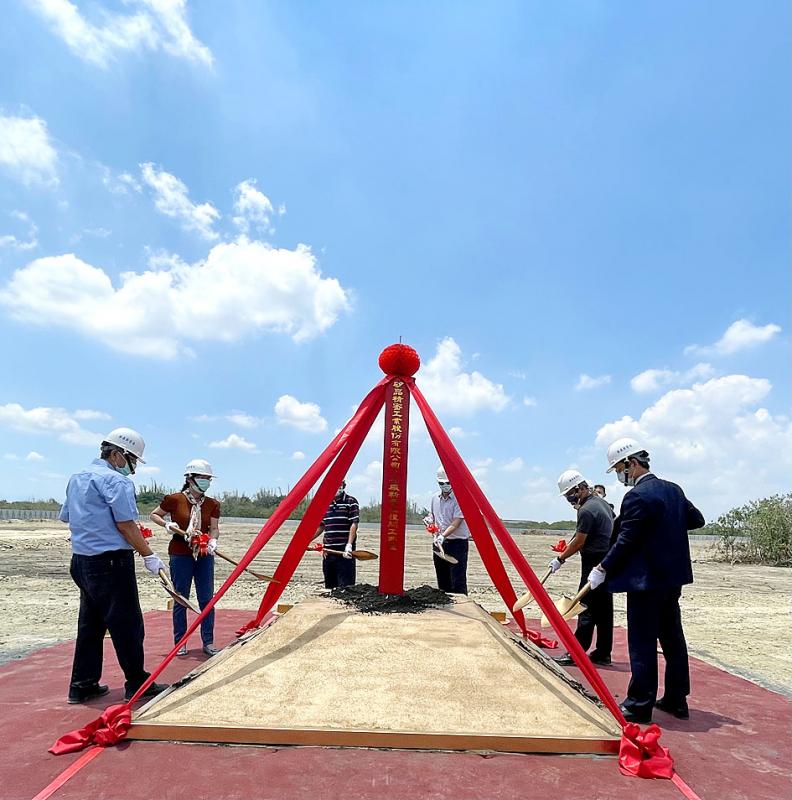Chip testing and packaging company Siliconware Precision Industries Co (SPIL, 矽品精密) yesterday said it plans to invest NT$80 billion (US$2.86 billion) to build a new plant in Changhua County’s Erlin Township (二林).
SPIL is investing in new capacity as 5G-related applications and an expanding stay-at-home economy have boosted demand for chip testing and packaging services, and to ease persistent constraints in the semiconductor supply chain.
A subsidiary of ASE Technology Holding Co (日月光投控), SPIL said in a statement that the first phase of the construction would be completed next year.

Photo courtesy of Siliconware Precision Industries Co
“The plant’s groundbreaking today is just the first of a series of capacity expansions,” SPIL chairman Tsai Chi-wen (蔡祺文) said in the statement.
The Erlin plant would be a major base providing high-end chip testing and packaging services. It should help SPIL fend off growing competition in the wake of capacity buildup in the US and Europe to reduce dependence on Asia, Taiwan in particular, for semiconductors, the statement said.
The new plant would create 7,500 jobs after reaching full capacity in the next eight to 10 years, the statement said.
It would occupy 14.5 hectares, three times larger than its existing plant in the county.
ASE is the world’s biggest supplier of chip testing and packaging services.
The Kaohsiung-based company told investors last month that a supply-demand imbalance continues to affect the whole semiconductor chain.
“That is why many of our customers have signed long-term agreements,” ASE said at the time.
Taiwan’s chip testing and packaging services providers are forecast to see production value grow 8.28 percent to NT$575.2 billion this year, compared with last year’s NT$531.2 billion, the Market Intelligence and Consulting Institute (MIC, 資策會) said yesterday.
Overall, Taiwan’s semiconductor industry is to grow its production value at an annual pace of 11.4 percent this year to NT$3.26 trillion.
MIC attributed the growth to strong demand for notebook computers, high-performance computing devices, automotive electronics and Internet-of-things products.

Hon Hai Precision Industry Co (鴻海精密) yesterday said that its research institute has launched its first advanced artificial intelligence (AI) large language model (LLM) using traditional Chinese, with technology assistance from Nvidia Corp. Hon Hai, also known as Foxconn Technology Group (富士康科技集團), said the LLM, FoxBrain, is expected to improve its data analysis capabilities for smart manufacturing, and electric vehicle and smart city development. An LLM is a type of AI trained on vast amounts of text data and uses deep learning techniques, particularly neural networks, to process and generate language. They are essential for building and improving AI-powered servers. Nvidia provided assistance

DOMESTIC SUPPLY: The probe comes as Donald Trump has called for the repeal of the US$52.7 billion CHIPS and Science Act, which the US Congress passed in 2022 The Office of the US Trade Representative is to hold a hearing tomorrow into older Chinese-made “legacy” semiconductors that could heap more US tariffs on chips from China that power everyday goods from cars to washing machines to telecoms equipment. The probe, which began during former US president Joe Biden’s tenure in December last year, aims to protect US and other semiconductor producers from China’s massive state-driven buildup of domestic chip supply. A 50 percent US tariff on Chinese semiconductors began on Jan. 1. Legacy chips use older manufacturing processes introduced more than a decade ago and are often far simpler than

STILL HOPEFUL: Delayed payment of NT$5.35 billion from an Indian server client sent its earnings plunging last year, but the firm expects a gradual pickup ahead Asustek Computer Inc (華碩), the world’s No. 5 PC vendor, yesterday reported an 87 percent slump in net profit for last year, dragged by a massive overdue payment from an Indian cloud service provider. The Indian customer has delayed payment totaling NT$5.35 billion (US$162.7 million), Asustek chief financial officer Nick Wu (吳長榮) told an online earnings conference. Asustek shipped servers to India between April and June last year. The customer told Asustek that it is launching multiple fundraising projects and expected to repay the debt in the short term, Wu said. The Indian customer accounted for less than 10 percent to Asustek’s

Gasoline and diesel prices this week are to decrease NT$0.5 and NT$1 per liter respectively as international crude prices continued to fall last week, CPC Corp, Taiwan (CPC, 台灣中油) and Formosa Petrochemical Corp (台塑石化) said yesterday. Effective today, gasoline prices at CPC and Formosa stations are to decrease to NT$29.2, NT$30.7 and NT$32.7 per liter for 92, 95 and 98-octane unleaded gasoline respectively, while premium diesel is to cost NT$27.9 per liter at CPC stations and NT$27.7 at Formosa pumps, the companies said in separate statements. Global crude oil prices dropped last week after the eight OPEC+ members said they would